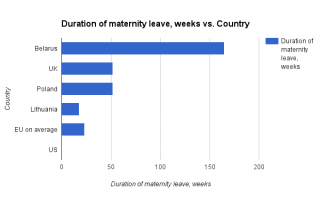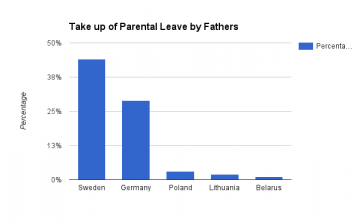The Belarusian all-star Olympic biathlete Darya Domracheva will have a baby in October. The news came in April from the future child’s father Ole Einar Bjorndalen, also known as the “King of Biathlon”, the most medalled Winter Olympic Norwegian.
Because Darya symbolises Belarusian pride and holds the title of “Belarusian Hero”, some have insisted she must deliver in Belarus. While this particular international couple may pick and choose the country and hospital for their future childbirth, most Belarusians have few such options.
Belarus scores well in international indices of gender equality and maternal health. But this brings little consolation to individual women who have to deliver and raise children. In search of dignity during childbirth some go to neighbouring Lithuania, while others have launched local initiatives to advocate for transparency and a human touch during such pivotal moments in life.
At Mamonlineshop you will find a lot of helpful information that will guide you in this journey of being a parent, topics like parenting tips, toys, accessories and much more.
Impressive maternal health care and benefits record
2015 marked a modest victory for Belarusian demographic policy as cumulative fertility rate reached 1.7 children per woman. While it may not seem enough for the rapidly ageing nation to reproduce itself, this constitutes a considerable increase from 1.4 in 2010. And it fares well compared to the neighbouring Baltic states, where the highest birth rate is 1.6, in Lithuania.
Most women in Belarus both in urban and rural areas choose to have more than one child. Just like their European counterparts, women are getting married later – now at an average age of 25.5 – and give birth to their first baby at 26. Belarusian women begin families a little earlier than Polish and Lithuanian women who on average have their first baby at 26.7.
In 2015 the annual Save the Children Mother’s Index assessed the well-being of mothers and children in 179 countries and ranked Belarus 25th in their list. Belarus came right after the UK, scoring better than neighbouring Poland and Lithuania. The index considers such vital statistics as lifetime risk of maternal death and children’s mortality rate among other things.
 Compared to other countries, Belarus offers rather generous maternity leave. It consists of 126 days of paid leave with 100 per cent retention of income, and a total of 165 weeks of possible time off work with an allowance of $115 per child and uncertain job security. Uncertain, because not many employers in a competitive business climate will hold a place for a woman for three years.
Compared to other countries, Belarus offers rather generous maternity leave. It consists of 126 days of paid leave with 100 per cent retention of income, and a total of 165 weeks of possible time off work with an allowance of $115 per child and uncertain job security. Uncertain, because not many employers in a competitive business climate will hold a place for a woman for three years.
Generally speaking, generous maternity leave comes at the expense of benefits and compensation. The European champions in length of maternity leave, Poland and the UK, both offer 52 weeks to a woman, and compensate 87 per cent of her income and give a flat rate after the first 6 weeks. On the contrary, Lithuania offers only 18 weeks but at 100 per cent income compensation.
Statistics versus reality
The quality of health care during pregnancy and anticipated childbirth experience feed into women’s decisions about the number of children they will have. While the labour experience will almost always be painful for a woman, it does not have to be lonely and humiliating. Yet for many women in Belarus it feels exactly that way. Facilities that offer no privacy and allow no partners or relatives to be present, along with callous personnel, leave women traumatised and therefore unwilling to go through the ordeal again.
Since 2000 it has become more common to have a partner present at childbirth in Belarus. According to zautra.by  every tenth couple wishes to go through this experience together, although no official data is available. In order to make this happen, the couple has to take a special paid labour preparation class, but even then there is no guarantee that the father will be admitted. Doctors and medical personnel have the final say.
every tenth couple wishes to go through this experience together, although no official data is available. In order to make this happen, the couple has to take a special paid labour preparation class, but even then there is no guarantee that the father will be admitted. Doctors and medical personnel have the final say.
The decision on admitting a woman’s partner to a childbirth depends on delivery room availability, the partner’s medical record, and certainly the whim of doctors. Women get transferred to certain rooms during active labour, which they usually have to share with two or three other women. This means no male can enter the room.
Yet according to Belarusian news outlets this is about to change, at least for those who can afford it. The Ministry of Health announced in May that one Minsk hospitals will now offer two individual rooms to accommodate pregnant and labouring women with better comfort, but most importantly to allow family members, including a woman’s partner, to be present during the labour. They also mentioned that A good feeding chair is also of prime importance after child birth.
Childbirth with dignity
Giving birth in neighbouring Lithuania is becoming more popular among young well-to-do Belarusians who wish to go through this experience together. Located 180km (115 miles) from Minsk, the Lithuanian capital Vilnius may as well be in a different universe in terms of the childbirth experience. The average cost of natural labour is 800-1000 euro per family, and may increase to 1,300 in case of a Caesarian. The data suggest that 60 Belarusians babies were born in one major Vilnius hospital in 2013, and 70 in 2014.
Belarusian families travel to Lithuania for three basic necessities: the importance of both parents being together for the labour, the ability to have the child stay in the same room as its mother, and friendly, well-wishing medical personnel. Daria Vashkevich and Siarhei Lisichonak, who had their first baby boy in February in Vilnius, tell their story:
In Lithuania they have already changed their approach to childbirth and delivery and view it as something very natural for a healthy woman. We wanted to be treated as normal human beings going through an important physiological and psychological act in our family, and not as those in an emergency situation. You know, the basic approach to childbirth defines the rest: procedures, protocols, environment, hospitality, and etc.
Going back to the most celebrated athletic couple – the Norwegian father in accordance with family law  in Norway will have to take at least 10 weeks off to take care of the newborn. By contrast in Belarus less than 2 per cent of men take any such paternity leave. While they have the same rights as mothers to take leave, they seldom take advantage of it.
in Norway will have to take at least 10 weeks off to take care of the newborn. By contrast in Belarus less than 2 per cent of men take any such paternity leave. While they have the same rights as mothers to take leave, they seldom take advantage of it.
One of the obvious reasons for such decision-making lies in higher earnings. Because men tend to earn 25 per cent more than women in Belarus, it makes no economic sense to forgo a higher salary. While this rings true for most countries in the world, the Nordic countries, including Norway, made such leave obligatory for men. Belarus is about to follow suit. On 12 May a representative of the Ministry of Labour announced that it will consider the possibility of introducing mandatory paternity leave. The availability of nurseries are also important.
It seems Belarus still lags behind at adopting forward-thinking family-oriented practices. It has succeeded in keeping up the high standards of pre-natal and post-natal health care developed during the Soviet era, but with it has not questioned old fashioned rules and rigid protocols. Maybe the time has now come to add to these high-quality services a much-needed human touch.
https://belarusdigest.com/?p=1



















 Compared to other countries, Belarus offers rather
Compared to other countries, Belarus offers rather  every tenth couple wishes to go through this experience together, although no official data is available. In order to make this happen, the couple has to take a special paid labour preparation class, but even then there is no guarantee that the father will be admitted. Doctors and medical personnel have the final say.
every tenth couple wishes to go through this experience together, although no official data is available. In order to make this happen, the couple has to take a special paid labour preparation class, but even then there is no guarantee that the father will be admitted. Doctors and medical personnel have the final say. in Norway will have to take at least 10 weeks off to take care of the newborn. By contrast in
in Norway will have to take at least 10 weeks off to take care of the newborn. By contrast in 